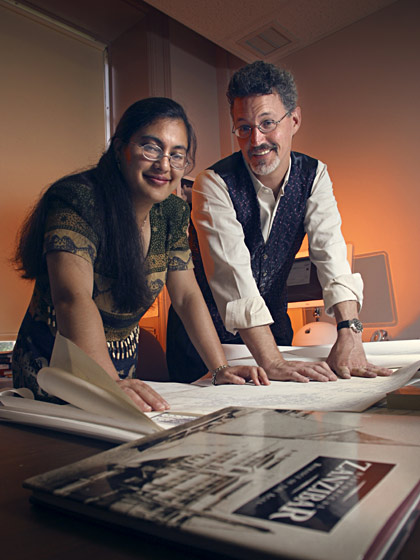Inku Subedi ’05 views the famed ancient cities of Kathmandu, Nepal and Zanzibar, Tanzania as far more than just exotic names on a map. The former is her hometown and the latter is the subject of a lengthy research project at Lafayette.
Subedi, a double major in anthropology & sociology and psychology, worked with William Bissell, assistant professor of anthropology. She took Bissell’s Anthropology of the City course during the spring semester and became interested in learning how her hometown preserves its wealth of historic streets and structures amid a glut of people and vehicles.
Bissell, who wrote his doctoral thesis on the historical anthropology of Zanzibar and is conducting research for a book, invited Subedi to help him finish a historical database on urban properties and residents in “Stone Town,” or Mji Mkongwe — the city’s oldest area.
Their summer work was part of Lafayette’s distinctive EXCEL Scholars program, in which students assist faculty in research while earning a stipend. Lafayette is a national leader in undergraduate research. Many of the 180 students who participate in EXCEL each year go on to publish papers in scholarly journals and/or present their findings at conferences.
“I started by reading lots of books on Zanzibar and Professor Bissell’s dissertation itself,” Subedi says, explaining that she then began examining translated tax assessment documents from the mid 1920s through the mid 1990s, which contained detailed information about houses and their occupants.
“The whole idea was to show that Stone Town is not a segregated place,” she says, pointing out that many historians and anthropologists have portrayed the city as sharply divided by race and class.
She notes that her work often was complicated because many homes that originally belonged to one household were divided over the years among descendents of the original householder.
“We also scanned a lot of images – photographs that Professor Bissell had taken and maps of the city,” Subedi says.
Bissell says that Subedi approached the project with great enthusiasm and “hit the ground running.”
“Constructing a database is something that depends upon critical judgment and analysis,” he says. “You really have to make decisions about what kind of data is crucial and what is peripheral. Inku became very skilled at making those kinds of decisions, and doing so with a kind of intuitive grasp.”
“She didn’t break stride at all in encountering the kind of work that professional historians and anthropologists do,” Bissell adds. “She really was able to keep pace in a way that is unusual for students.”
Subedi was pleased to work with Bissell and learn more about anthropology. “He is really patient and he looks at things very objectively,” she says. “He helped keep me on track. One thing I really learned is what being an anthropologist entails. It includes work that is sometimes tedious. You look at the end product, and you tend to forget what goes into it.”
She was an EXCEL Scholar last fall as well, exploring American attitudes on aging with Jamila Bookwala, assistant professor of psychology.
Subedi serves as a psychology lab assistant and is secretary of the Asian Cultural Association and a member of the International Students Association.
As a national leader in undergraduate research, Lafayette sends one of the largest contingents to the National Conference on Undergraduate Research each year. Over the past five years, more than 130 Lafayette students have presented results from research conducted with faculty mentors, or under their guidance, at the conference.

Inku Subedi ’05 researched the historical anthropology of Zanzibar, Tanzania, with William Bissell, assistant professor of anthropology.
